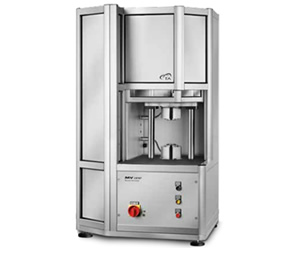View HT Viscometer Brochure Viscometer Accessories Request a Quote
Rotational viscometry is used to determine the viscosity of a liquid by measuring the torque required to rotate a cylindrical bob immersed in the liquid sample material. A higher viscosity of the sample will result in a greater torque required to maintain a set rotation rate. Unlike several other rheological measurement techniques, this method can be combined well with a high-temperature furnace to measure the viscosity of many molten materials from the highest temperatures to the point of solidification.
The TA Instruments | Waters high temperature viscometer, VIS413, measures the dynamic viscosity of materials with Newtonian behavior such as glasses, slags, or mold powder. The viscometer operates by measuring the shear stress and shear rate of a rotating bob immersed in a fluid filled cup under controlled temperature. Measurements are usually performed in automated mode of operation, in which the shear rate is automatically lowered when the torque exceeds a threshold value. This allows testing to cover a wide range of temperatures and several orders of magnitude of viscosities in a single measurement. A freely programmable mode of operation, in which shear rates and temperatures are set as desired, is also available.
The VIS413 viscometer is capable of measuring in an industry-leading sample temperature range of up to 1750°C and is fully capable of performing analysis in a variety of controlled inert or reactive atmospheres and even vacuum. The possibility of using disposable alumina or graphite cups and rotors allows testing with low, fixed costs per measurement. After each measurement, the cup and rotor are replaced, and the viscometer is available for the next measurement right away. Alternatively, testing can be performed using platinum or molybdenum metal cups and rotors. These are usually cleaned by heat and acid treatment procedure and re-used for the next analysis.
High Temperature Viscometer Instruments
Application Notes
- High Temperature Rotational Viscometry of Mold Powder for Continuous Casting
- Polymer Flow and Mechanical Characterization for Material Development, Processing, and Performance
- Rheological Analysis of Hydrogel Materials
- Using Rheology and Thermal Analysis to Help Optimize Processing Conditions of Recycled PET
- Rheology as a Suitable Tool for Quality Control of Collagen Hydrogels
- Rheological Evaluation of Battery Slurries with Different Graphite Particle Size and Shape
- Determination of the Linear Viscoelastic Region in Polymers
- Temperature and Frequency Trends of the Linear Viscoelastic Region
- Determining the Linear Viscoelastic Region in Creep and Stress Relaxation Tests
- Determining the Linear Viscoelastic Region in Oscillatory Measurements
- Exploring the Viscoelastic Properties of Cheese Using a Rheometer
- Determination of the Linear Viscoelastic Region of A Polymer Using a Strain Sweep on the DMA 2980



